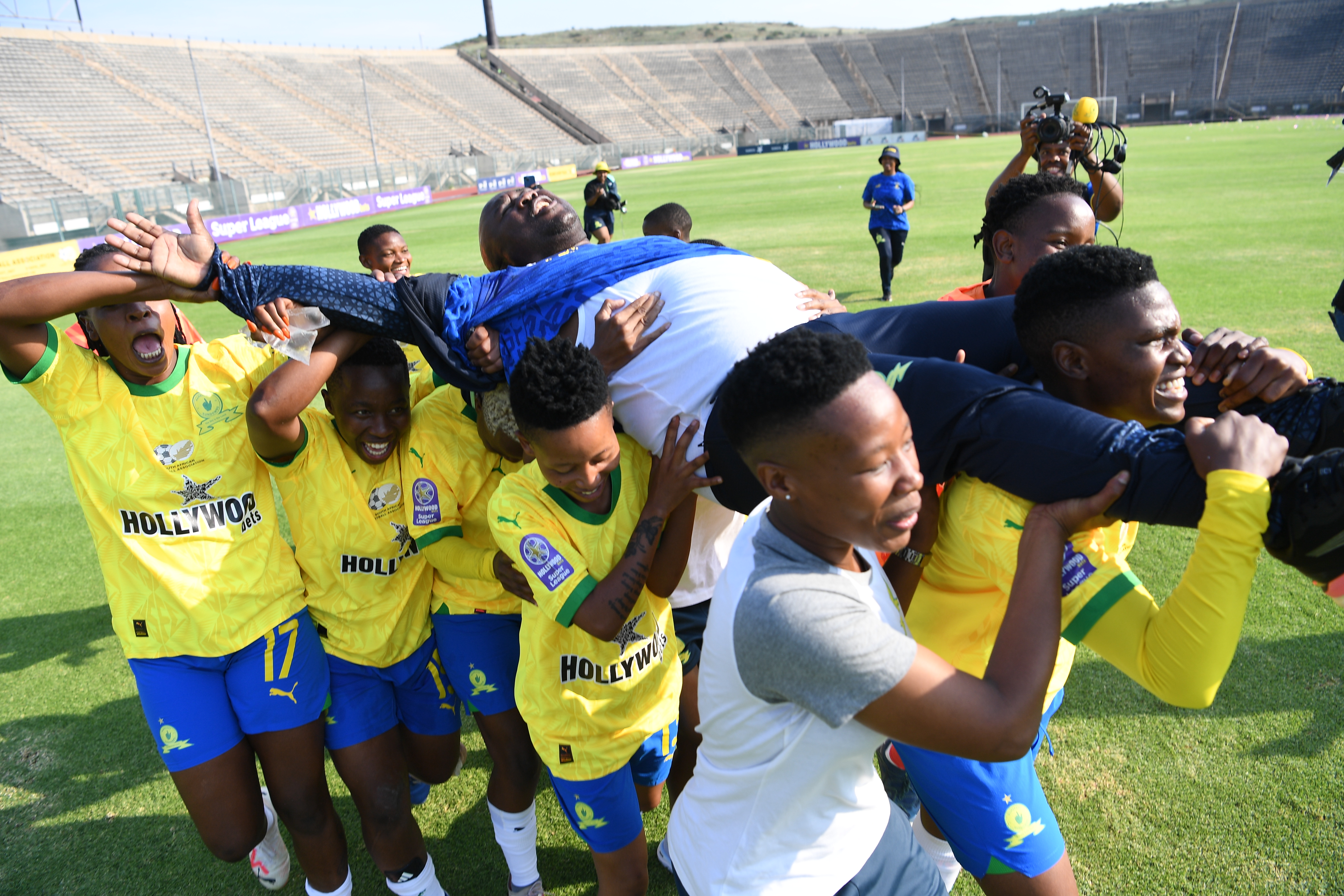Mamelodi Sundowns Ladies are back in Hollywoodbets Super League action this weekend following a trip to the US where they learnt some harsh lessons, despite being reigning South African and African champions.
Sundowns took part in the third edition of Women’s Cup, an invitational club tournament that saw four teams from four different continents battle for supremacy.
 Jerry Tshabalala, the head coach of Mamelodi Sundowns Ladies. (Photo: Philip Maeta / Gallo Images)
Jerry Tshabalala, the head coach of Mamelodi Sundowns Ladies. (Photo: Philip Maeta / Gallo Images)
In this year’s iteration, the South Africans debuted, featuring alongside hosts and eventual winners Kansas City Current, Japan’s Kobe Leonessa and Atlético Madrid of Spain.
They returned from the tournament having learnt some harsh lessons. In the two matches they played, they conceded five goals – losing 3-0 to Kansas in the semifinal, then falling 2-0 to Kobe in the bronze medal match.
In addition to conceding those goals, Sundowns also failed to score during their two matches in the tournament. An overall outcome somewhat surprising for a side that regularly finds the back of the net, while ensuring they hardly concede.
The good and the bad
However, participating will serve the reigning African champions well in the long run, as the team’s head coach Jerry Tshabalala pointed out in his post-tournament analysis.
“It is disappointing to play the whole tournament without scoring, especially since we are known for doing that regularly. I said before that we are in this tournament to learn, and we have learned different things. I believe that when we come back another time, we will return as a better team,” Tshabalala said.
Banyana Ba Style sit at the summit of the Super League, enjoying a nine-point gap between themselves and second-placed University of the Western Cape. However, the latter have played two games less and may narrow the gap. Nevertheless, Sundowns are favourites to win a fifth consecutive league title.
The Pretoria side will also head into the 2024 Caf Champions League as firm favourites to defend the continental title they clinched last season. Tshabalala believes the assignments they encountered in the US will serve them well in their quest to remain African queens.
“You know, playing against Kansas City Current and Kobe was a game-changer for us, because it pushed us beyond our comfort zone and showed us where we needed to improve,” the coach stated.
“Competing against teams of this caliber highlighted both our strengths and areas that needed fine-tuning. One such area is in our defensive organisation. The pace and precision of our opponents exposed gaps that we need to address if we are to maintain our dominance at home and on the continent,” Tshabalala said.
“We realised that our transition play – particularly when moving from defense to attack – requires more speed and coordination. The games showed us that to compete at the highest level, we must be quicker and more decisive in these critical moments. Our finishing also needs work; we created chances but struggled to convert them, and that is something we will focus on in our upcoming training sessions,” the 44-year-old tactician said.
African soccer diagnosis
Sundowns’ involvement in the Women’s Cup can be dissected from a few different angles. One being the fact that they were even invited to begin with. This shows that their dominance of African soccer has been noticed by the rest of the world.
Though they struggled to truly showcase all their qualities in Kansas, they remain the main point of reference for women’s club soccer in Africa, with the sport on the continent generally still some way off the standards that have been set by Masandawana, who are backed by the wealth of the Motsepe family.
The exception being with countries such as Morocco and Zambia, with whom the gap is far smaller. This is seen by the rapid growth of their senior national teams in recent years, as well as the calibre of players their systems are producing.
Nigeria had always been the gold standard from a national team perspective. However, administrative failures from the country’s soccer bosses have seen a slight regression in Nigerian soccer.
What has become clear over the past few years is that building a good league takes time, patience and lots of money. Hence, tournaments such as the Women’s Cup are vital for African sides to partake in and feel how it is to compete against teams from nations that have mastered this balancing act, and are thriving.
While the continent chips away at trying to reach the global standard, it is also important to export players – for the sake of the whole soccer ecosystem in Africa, as well as for the players as individuals.
International moves equate to improvement as a player, more money and the gaining of invaluable knowledge to pass on when they return home. DM




 Jerry Tshabalala, the head coach of Mamelodi Sundowns Ladies. (Photo: Philip Maeta / Gallo Images)
Jerry Tshabalala, the head coach of Mamelodi Sundowns Ladies. (Photo: Philip Maeta / Gallo Images)